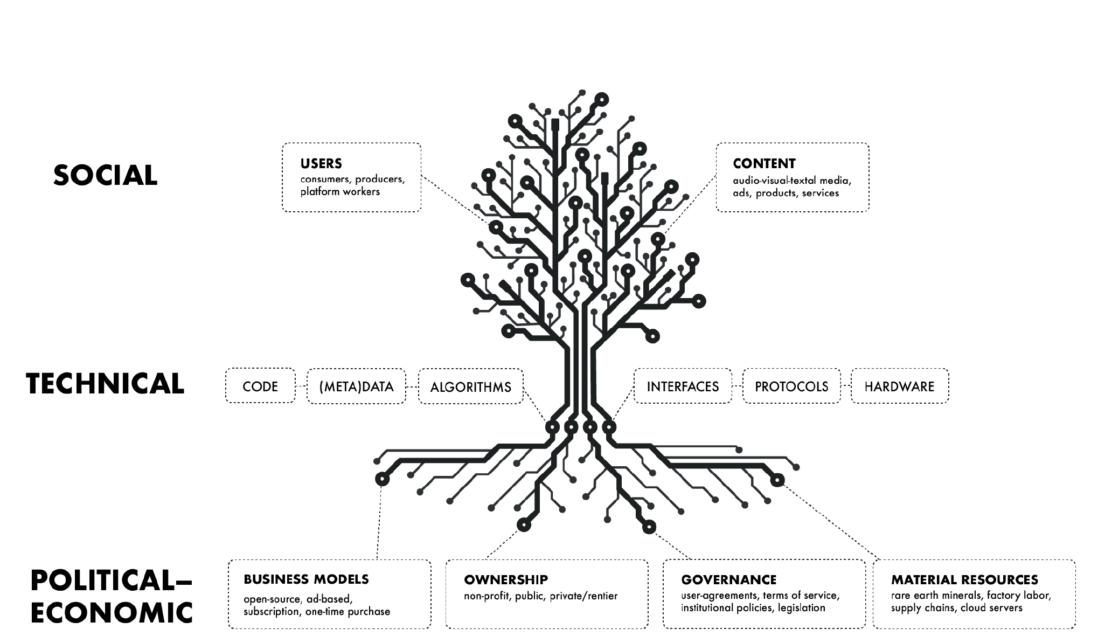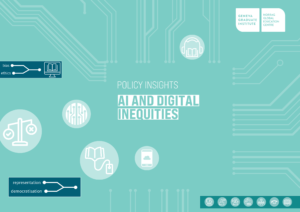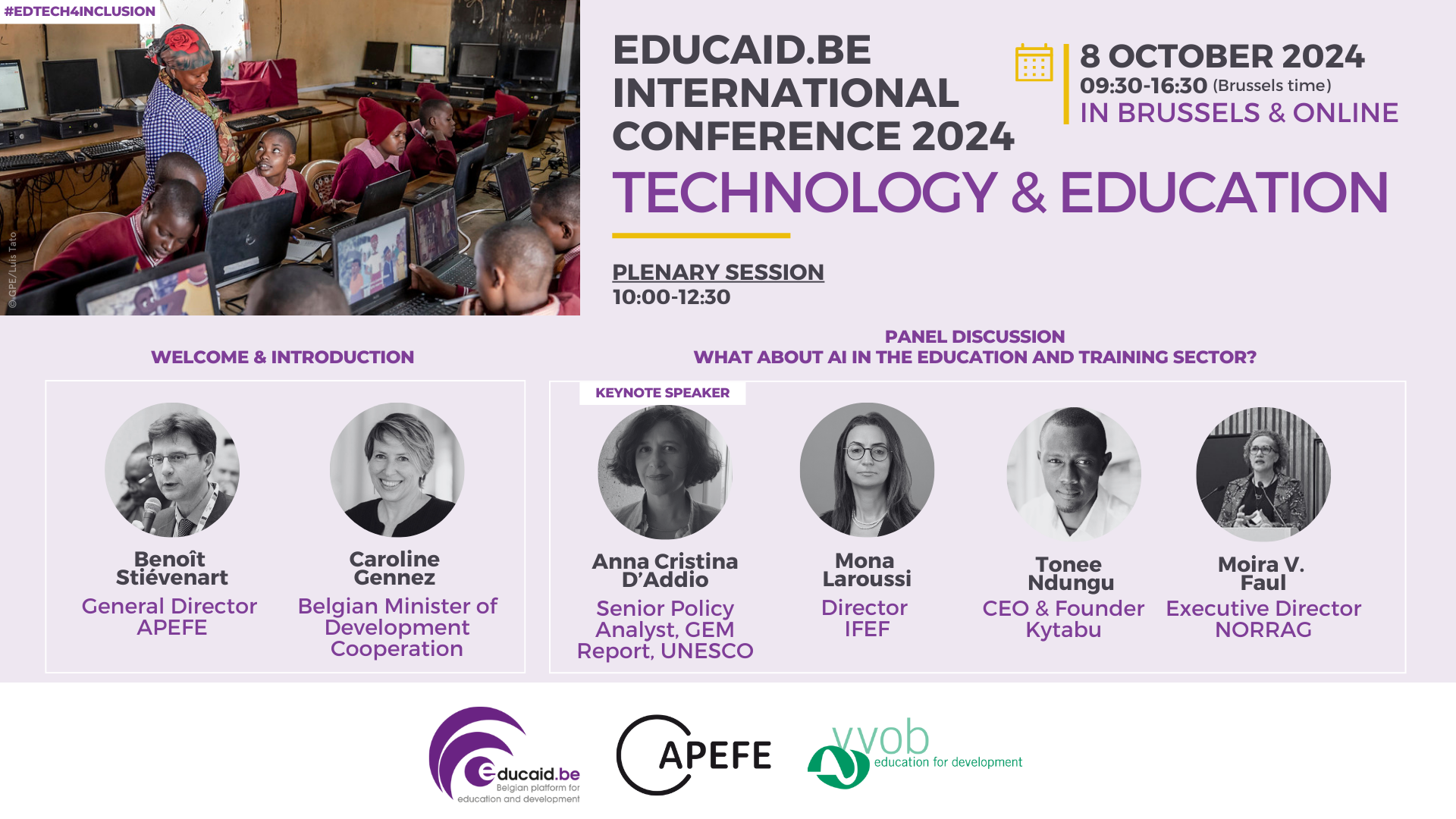Educaid.be International Conference - Leveraging Technologies for Inclusive Quality Education
Technology & Education
Date: Tuesday 8 October, 2024
Time: 09:30 – 16:30 CET
Location: Enabel (Brussels) & Online
AI for Education—Beyond Classrooms and Behind the Content
When thinking about critical literacies for AI, we have to think about the social, the technical, the political and the economic. Because if we do not actually address all of these issues, then we cannot use AI in an ethical way; we cannot develop AI and design AI in ways that are useful and ethical; we cannot think about deploying and funding AI that is ethical and useful for education. So, we need to understand what can go into AI for education—not AI for AI, and not only for profit. That is not to say that profit is a bad thing. Some profit is absolutely fine. But if it is for that alone, and not for education, that is when it becomes problematic.
Aspects of critical literacies for AI and platform ecologies

Source: Nichols & Garcia, 2024
Social
First of all, thinking about the level of the users. And there is a lot that is done in the education world around students as end users. But we can’t ignore the fact that this work that was done by humans—artificial intelligence relies on human intelligence. These are other types of users, including Kenyan workers who were exploited Not only were they exploited in terms of the money that they were paid, their social-emotional well-being was basically put on the line ais they cleaned up horrendous images in order to make certain AI applications clean enough to be allowed into education systems. So the work that was done to clean up AI to make it okay for our children’s social and emotional well-being has damaged those workers’ social and emotional well-being. And we can’t lose sight of those workers. And this also affects teachers and other decision makers as well.
Another point on users, if we look at this Gartner hype cycle for emerging technologies: this is something that has been used for decades with many different technologies. We are currently
right at the top of the peak of inflated expectations. This is not me saying this – these are technology specialists saying this. Things are going to probably go down and then they are going to go up again. But one of the things that the technologists know when you get to that point is you then have to do much more experimentation in order to work out what it is that is useful, profitable, etc.. So these experiments are great because then companies are going to be able to separate the wheat from the chaff, so to speak. But those experiments are going to be on human beings. It is human experimentation – where is the consent, where are the guardrails? Very happy to see that those are being put in place, but let’s also be very careful about how much we joke about regulation being a bad thing. There is absolutely a place for it. If there are guardrails for human experimentation in labs, there can/should be and there will be, hopefully, guardrails here as well.
Technical
Moving on to something in the technical space: data and the algorithms. Many AI technologists say “we scraped the entire web and so we now have the world inside our language models, our images, etc.” It is not the world, it is a very specific slice of the world. It is a slice of the world that is W.E.I.R.D.: Western and white; educated and English-speaking (not national languages in so many different countries, nor minority languages). Because all of the countries in my continent, in Africa, have official languages, a colonial language, then multiple other languages. And also in Asia, and in many Latin American countries. The people who had the computers in order to make the content, in order for it to be on the web are mainly in industrialized countries or were rich. Now be very careful with this idea of “rich.” This is about global South-global North but it is also about rich and poor in the global North, and increasingly the difference between rich and poor in the global South. Because those people whose data was scraped in Kenya or in Zimbabwe, in my country, or in any of these countries, they are going to be people who are relatively privileged in their own countries. And I do believe that this is a reason why these LLMs generate absolute nonsense with such confidence, because that tone of confidence is a function of privilege.
So what are the implications of that? Yes it is about access – that digital divide when we are talking about access. Sure, definitely. And also, who has access to representation? To what extent is that representation reinforced? To what extent is that representation amplified? Anyone who has done a Google image search, or an image search in any AI model, or tried to generate an image with the word “African,” what do you get? You get a woman in braids with beads and beads and more beads… And she is beautiful, she is wonderful. But if you put “European” into exactly the same search engine? You get a map, you do not get a person. You get a blue flag with yellow stars on it, you do not get a single individual. So “European” according to these LLMs is talking about a region, it is talking about multiplicities, it is talking about Union, it is talking about politics. By contrast, a query for “African” shows one woman, one story, one hairstyle, one set of jewelry.
Next, who is allowed to do the research? You can’t get under the hood to audit these algorithms even if you try. And you can’t try unless you have a huge amount of money, knowledge and training behind you. So the research that is put out saying “we did this and look at these amazing effects”: how do you verify it? You can’t.
The research where you go and you say “what are your KPIs? What is a good key performance indicator for edtech? Learning outcomes is what we all want, great. We did a micro study on some edtech. There was not a single education KPI. The KPIs were about implementation of the technology. And if we implement the technology properly, then… magic happens and then… learning outcomes? There was nothing there that actually gave you a clean path through it.
Political-economic
Politics is not abstract; we need to ask in whose interest? Regulation and the governance matters. It will always be there. The market does not exist in some fantastical alternative dimension; there will always be regulation. There will always be governance. The question is: in whose interest? By whom? For whom? Always.
Business Models
One of the things we need to be very careful with all edtech is government capture and procurement. If I have you as one person who is buying my service I have one customer. If Educaid forces all of you in this room to sign up to my app and buy my app, I have captured all of you. That is my classroom. Then what about the school? What about the district? What about the whole education system in a country? That is a lot of customers for one sales pitch. So how do we make sure that that is not happening?
Material Resources
AI takes lots of power and also enormous amounts of water, which there is less and less of it, in my country particularly, how do we make sure that we’re using the resources that we have in such a way that is worthwhile?
Governance
This is about individual data and consent. My children’s school has signed up to a certain suite of things. The school has signed up; my child has not given their consent even if they would know how to. And they’d laugh at me all the time that I actually read the consent agreements, and I say “no cookies”, “oh you’re such you’re such a Gen X mom.” However, I have not been able to give consent to that either because the school already gave consent. Where is the meaningful consent in all of this?
Ownership
Ownership is also an equity issue. Many recent agreements have been drawn up, including the UN Global Digital Compact (September 2024), the European Union has done some work on this, UNESCO has done a lot of work on the ethics of AI, and how to work with that, and how to work with private sector companies.
One key factor that sometimes is forgotten in governance is monopolisation. Because the monopolies are the ones who have the resources to develop the large language models, that have the resources to develop and to run those data centers, and that also have the resources to stop innovation and innovators, unless they are already under contract. So let’s not think that innovation is on one side of the room and regulation on the other. The only reason that Mark Zuckerberg has a company at all now, is because Microsoft’s expanding monopoly in the 1990s was stopped through antimonopoly legislation and regulation. Let’s not lose sight of that very recent history. Facebook would not exist. Meta would not exist if it were not for antimonopoly regulation. And now, Facebook can swallow up WhatsApp, and can swallow up Instagram—the innovators—in order to not be in a competitive field. I am using those as examples; it happens in many places. Google was recently found guilty of anti-monopolistic practices too. Regulation can support innovation. It is not one or the other.
With all of that, I hope I broke down a little bit but I think it is really important to get all of that, even if I have just been able to touch on a couple of things, in order to understand all of what lies behind the content; all of that is behind what we actually see.
 Policy Insights: AI and Digital Inequities. This publication will help to actually be able to think these things through. Additionally, as an instantiation of trying to move away from this W.E.I.R.D. world that we are currently sort of dominated by, we managed to get 70% women authors. So it is a collection of insights from a series of diverse experts: 70% women; 40% non-white; 40% Global South. If we can do that with AI — and congratulations/félicitations à educaid.be and the organizers of this event today for also managing to get a panel that is not representative of the usual AI technology people — If we can do that with AI, nobody has any excuse to not do it on any other topic, I would argue. We have this initiative: the South also knows. Because we know we need to convince others that this is the case. If you are from the global South yourself, please join the network. If you are not from the global South, search the database and tell your colleagues. The next time anybody says to you “I know there are experts on whatever it is in the global South, I just can’t find them,” tell them to go here. And also we are a network of 5,800 education specialists around the world. You are very welcome to join us and continue this journey together.
Policy Insights: AI and Digital Inequities. This publication will help to actually be able to think these things through. Additionally, as an instantiation of trying to move away from this W.E.I.R.D. world that we are currently sort of dominated by, we managed to get 70% women authors. So it is a collection of insights from a series of diverse experts: 70% women; 40% non-white; 40% Global South. If we can do that with AI — and congratulations/félicitations à educaid.be and the organizers of this event today for also managing to get a panel that is not representative of the usual AI technology people — If we can do that with AI, nobody has any excuse to not do it on any other topic, I would argue. We have this initiative: the South also knows. Because we know we need to convince others that this is the case. If you are from the global South yourself, please join the network. If you are not from the global South, search the database and tell your colleagues. The next time anybody says to you “I know there are experts on whatever it is in the global South, I just can’t find them,” tell them to go here. And also we are a network of 5,800 education specialists around the world. You are very welcome to join us and continue this journey together.

